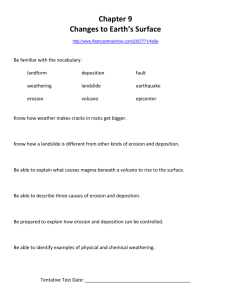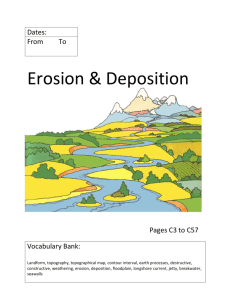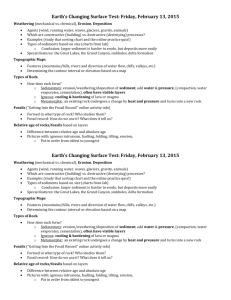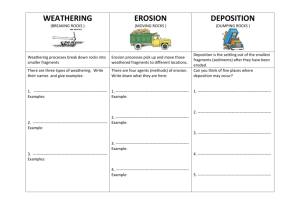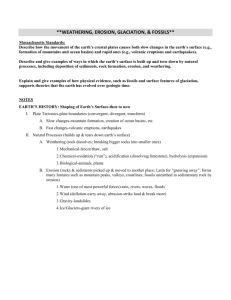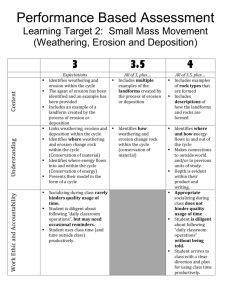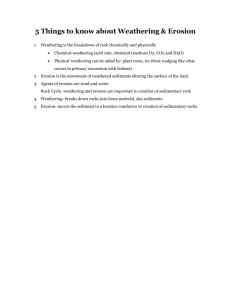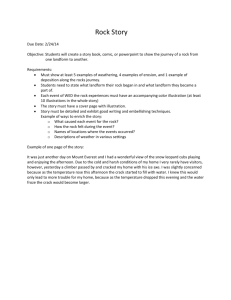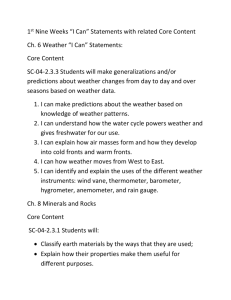6th Grade Science Curriculum Map: Georgia Standards
advertisement
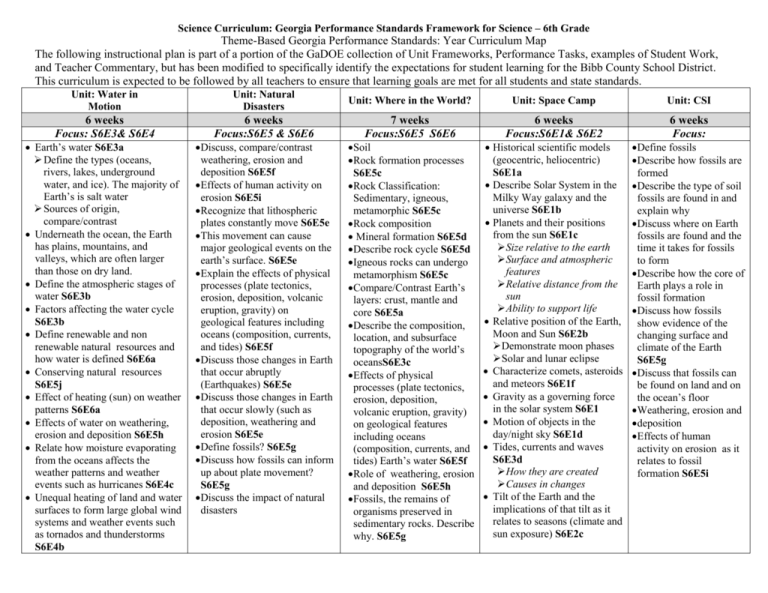
Science Curriculum: Georgia Performance Standards Framework for Science – 6th Grade Theme-Based Georgia Performance Standards: Year Curriculum Map The following instructional plan is part of a portion of the GaDOE collection of Unit Frameworks, Performance Tasks, examples of Student Work, and Teacher Commentary, but has been modified to specifically identify the expectations for student learning for the Bibb County School District. This curriculum is expected to be followed by all teachers to ensure that learning goals are met for all students and state standards. Unit: Water in Motion Unit: Natural Disasters Unit: Where in the World? Unit: Space Camp Unit: CSI 6 weeks Focus: S6E3& S6E4 6 weeks Focus:S6E5 & S6E6 7 weeks Focus:S6E5 S6E6 6 weeks Focus:S6E1& S6E2 6 weeks Focus: Earth’s water S6E3a Define the types (oceans, rivers, lakes, underground water, and ice). The majority of Earth’s is salt water Sources of origin, compare/contrast Underneath the ocean, the Earth has plains, mountains, and valleys, which are often larger than those on dry land. Define the atmospheric stages of water S6E3b Factors affecting the water cycle S6E3b Define renewable and non renewable natural resources and how water is defined S6E6a Conserving natural resources S6E5j Effect of heating (sun) on weather patterns S6E6a Effects of water on weathering, erosion and deposition S6E5h Relate how moisture evaporating from the oceans affects the weather patterns and weather events such as hurricanes S6E4c Unequal heating of land and water surfaces to form large global wind systems and weather events such as tornados and thunderstorms S6E4b Discuss, compare/contrast weathering, erosion and deposition S6E5f Effects of human activity on erosion S6E5i Recognize that lithospheric plates constantly move S6E5e This movement can cause major geological events on the earth’s surface. S6E5e Explain the effects of physical processes (plate tectonics, erosion, deposition, volcanic eruption, gravity) on geological features including oceans (composition, currents, and tides) S6E5f Discuss those changes in Earth that occur abruptly (Earthquakes) S6E5e Discuss those changes in Earth that occur slowly (such as deposition, weathering and erosion S6E5e Define fossils? S6E5g Discuss how fossils can inform up about plate movement? S6E5g Discuss the impact of natural disasters Soil Rock formation processes S6E5c Rock Classification: Sedimentary, igneous, metamorphic S6E5c Rock composition Mineral formation S6E5d Describe rock cycle S6E5d Igneous rocks can undergo metamorphism S6E5c Compare/Contrast Earth’s layers: crust, mantle and core S6E5a Describe the composition, location, and subsurface topography of the world’s oceansS6E3c Effects of physical processes (plate tectonics, erosion, deposition, volcanic eruption, gravity) on geological features including oceans (composition, currents, and tides) Earth’s water S6E5f Role of weathering, erosion and deposition S6E5h Fossils, the remains of organisms preserved in sedimentary rocks. Describe why. S6E5g Historical scientific models (geocentric, heliocentric) S6E1a Describe Solar System in the Milky Way galaxy and the universe S6E1b Planets and their positions from the sun S6E1c Size relative to the earth Surface and atmospheric features Relative distance from the sun Ability to support life Relative position of the Earth, Moon and Sun S6E2b Demonstrate moon phases Solar and lunar eclipse Characterize comets, asteroids and meteors S6E1f Gravity as a governing force in the solar system S6E1 Motion of objects in the day/night sky S6E1d Tides, currents and waves S6E3d How they are created Causes in changes Tilt of the Earth and the implications of that tilt as it relates to seasons (climate and sun exposure) S6E2c Define fossils Describe how fossils are formed Describe the type of soil fossils are found in and explain why Discuss where on Earth fossils are found and the time it takes for fossils to form Describe how the core of Earth plays a role in fossil formation Discuss how fossils show evidence of the changing surface and climate of the Earth S6E5g Discuss that fossils can be found on land and on the ocean’s floor Weathering, erosion and deposition Effects of human activity on erosion as it relates to fossil formation S6E5i

